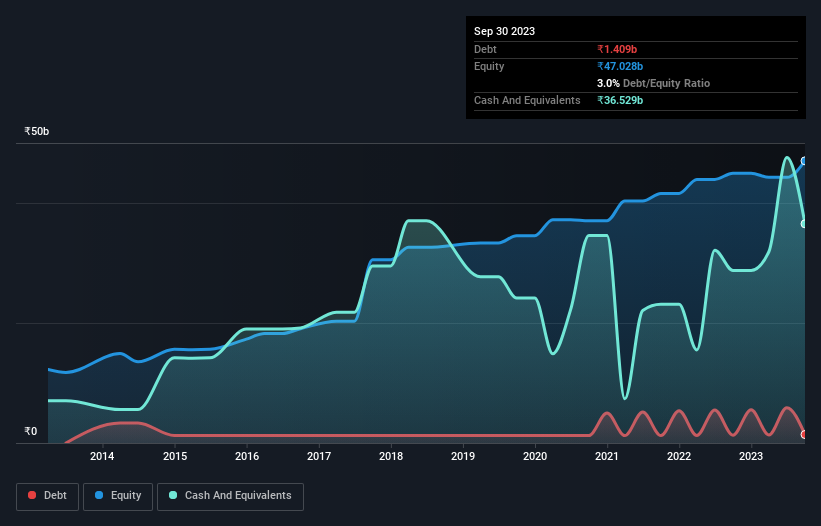Is Cochin Shipyard (NSE:COCHINSHIP) A Risky Investment?

Legendary fund manager Li Lu (who Charlie Munger backed) once said, 'The biggest investment risk is not the volatility of prices, but whether you will suffer a permanent loss of capital.' It's only natural to consider a company's balance sheet when you examine how risky it is, since debt is often involved when a business collapses. We note that Cochin Shipyard Limited (NSE:COCHINSHIP) does have debt on its balance sheet. But the real question is whether this debt is making the company risky.
What Risk Does Debt Bring?
Debt is a tool to help businesses grow, but if a business is incapable of paying off its lenders, then it exists at their mercy. If things get really bad, the lenders can take control of the business. However, a more usual (but still expensive) situation is where a company must dilute shareholders at a cheap share price simply to get debt under control. By replacing dilution, though, debt can be an extremely good tool for businesses that need capital to invest in growth at high rates of return. When we think about a company's use of debt, we first look at cash and debt together.
Check out our latest analysis for Cochin Shipyard
What Is Cochin Shipyard's Debt?
You can click the graphic below for the historical numbers, but it shows that as of September 2023 Cochin Shipyard had ₹1.41b of debt, an increase on ₹1.30b, over one year. But it also has ₹36.5b in cash to offset that, meaning it has ₹35.1b net cash.

How Strong Is Cochin Shipyard's Balance Sheet?
We can see from the most recent balance sheet that Cochin Shipyard had liabilities of ₹57.6b falling due within a year, and liabilities of ₹4.95b due beyond that. Offsetting these obligations, it had cash of ₹36.5b as well as receivables valued at ₹3.23b due within 12 months. So its liabilities outweigh the sum of its cash and (near-term) receivables by ₹22.8b.
Given Cochin Shipyard has a market capitalization of ₹172.0b, it's hard to believe these liabilities pose much threat. Having said that, it's clear that we should continue to monitor its balance sheet, lest it change for the worse. While it does have liabilities worth noting, Cochin Shipyard also has more cash than debt, so we're pretty confident it can manage its debt safely.
The modesty of its debt load may become crucial for Cochin Shipyard if management cannot prevent a repeat of the 43% cut to EBIT over the last year. Falling earnings (if the trend continues) could eventually make even modest debt quite risky. The balance sheet is clearly the area to focus on when you are analysing debt. But ultimately the future profitability of the business will decide if Cochin Shipyard can strengthen its balance sheet over time. So if you want to see what the professionals think, you might find this free report on analyst profit forecasts to be interesting.
Finally, a company can only pay off debt with cold hard cash, not accounting profits. While Cochin Shipyard has net cash on its balance sheet, it's still worth taking a look at its ability to convert earnings before interest and tax (EBIT) to free cash flow, to help us understand how quickly it is building (or eroding) that cash balance. Looking at the most recent three years, Cochin Shipyard recorded free cash flow of 30% of its EBIT, which is weaker than we'd expect. That weak cash conversion makes it more difficult to handle indebtedness.
Summing Up
While Cochin Shipyard does have more liabilities than liquid assets, it also has net cash of ₹35.1b. So we are not troubled with Cochin Shipyard's debt use. The balance sheet is clearly the area to focus on when you are analysing debt. But ultimately, every company can contain risks that exist outside of the balance sheet. For example - Cochin Shipyard has 1 warning sign we think you should be aware of.
At the end of the day, it's often better to focus on companies that are free from net debt. You can access our special list of such companies (all with a track record of profit growth). It's free.
If you're looking to trade Cochin Shipyard, open an account with the lowest-cost platform trusted by professionals, Interactive Brokers.
With clients in over 200 countries and territories, and access to 160 markets, IBKR lets you trade stocks, options, futures, forex, bonds and funds from a single integrated account.
Enjoy no hidden fees, no account minimums, and FX conversion rates as low as 0.03%, far better than what most brokers offer.
Sponsored ContentNew: AI Stock Screener & Alerts
Our new AI Stock Screener scans the market every day to uncover opportunities.
• Dividend Powerhouses (3%+ Yield)
• Undervalued Small Caps with Insider Buying
• High growth Tech and AI Companies
Or build your own from over 50 metrics.
Have feedback on this article? Concerned about the content? Get in touch with us directly. Alternatively, email editorial-team (at) simplywallst.com.
This article by Simply Wall St is general in nature. We provide commentary based on historical data and analyst forecasts only using an unbiased methodology and our articles are not intended to be financial advice. It does not constitute a recommendation to buy or sell any stock, and does not take account of your objectives, or your financial situation. We aim to bring you long-term focused analysis driven by fundamental data. Note that our analysis may not factor in the latest price-sensitive company announcements or qualitative material. Simply Wall St has no position in any stocks mentioned.
About NSEI:COCHINSHIP
Cochin Shipyard
Engages in the shipbuilding and repair of ships/offshore structures in India.
Solid track record with adequate balance sheet.
Similar Companies
Market Insights
Community Narratives



